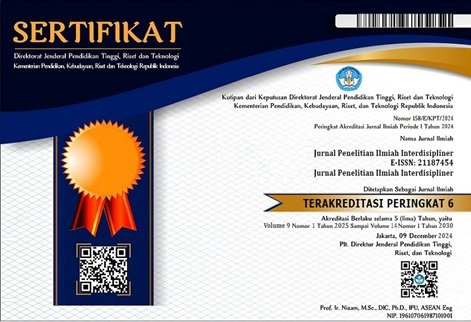PENGARUH PENDIDIKAN AKUNTANSI FORENSIK DAN MINAT MAHASISWA TERHADAP PEMAHAMAN AKUNTANSI FORENSIK SERTA LITERASI ANTI-FRAUD:STUDI PADA MAHASISWA NON-AKUNTANSI DENGAN PERSPEKTIF IMPLEMENTASI ARTIFICIAL INTELLIGENCE
Kata Kunci:
Akuntansi Forensik, Minat Mahasiswa, Literasi Anti-Fraud, Artificial Intelligence, SEM-PLSAbstrak
Penelitian ini bertujuan untuk mengkaji pengaruh pendidikan akuntansi forensik dan minat mahasiswa terhadap pemahaman akuntansi forensik, serta dampaknya terhadap literasi anti-fraud, dengan mempertimbangkan persepsi terhadap implementasi artificial intelligence (AI) sebagai variabel moderasi. Studi ini dilakukan terhadap mahasiswa non-akuntansi di berbagai perguruan tinggi yang telah menerima atau mengenal konsep dasar akuntansi forensik. Menggunakan metode kuantitatif dengan pendekatan Structural Equation Modeling Partial Least Square (SEM-PLS) dan aplikasi SmartPLS 3, penelitian ini menganalisis lima variabel utama: pendidikan akuntansi forensik, minat mahasiswa, pemahaman akuntansi forensik, literasi anti-fraud, serta persepsi terhadap AI. Hasil penelitian menunjukkan bahwa pendidikan akuntansi forensik dan minat mahasiswa berpengaruh positif dan signifikan terhadap pemahaman akuntansi forensik. Pemahaman tersebut secara signifikan meningkatkan literasi anti-fraud mahasiswa. Selain itu, persepsi terhadap AI secara signifikan memoderasi hubungan antara pemahaman akuntansi forensik dan literasi anti-fraud. Implikasi dari penelitian ini menunjukkan pentingnya integrasi teknologi dalam pendidikan akuntansi, khususnya dalam konteks pencegahan dan deteksi kecurangan.
This study aims to examine the influence of forensic accounting education and students' interest on the understanding of forensic accounting, as well as its impact on anti-fraud literacy, by considering the perception of artificial intelligence (AI) implementation as a moderating variable. The study was conducted among non-accounting students from various universities who have received or are familiar with the basic concepts of forensic accounting. Using a quantitative method with the Structural Equation Modeling Partial Least Square (SEM-PLS) approach and the SmartPLS 3 application, this research analyzes five main variables: forensic accounting education, student interest, understanding of forensic accounting, anti-fraud literacy, and perception of AI. The results show that forensic accounting education and student interest have a positive and significant effect on the understanding of forensic accounting. This understanding significantly enhances students’ anti-fraud literacy. In addition, the perception of AI significantly moderates the relationship between the understanding of forensic accounting and anti-fraud literacy. The implications of this research highlight the importance of integrating technology into accounting education, especially in the context of fraud prevention and detection.





